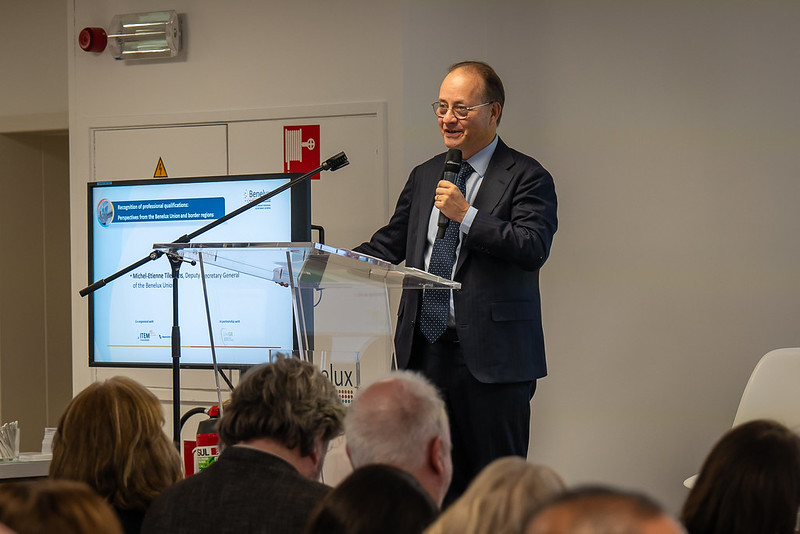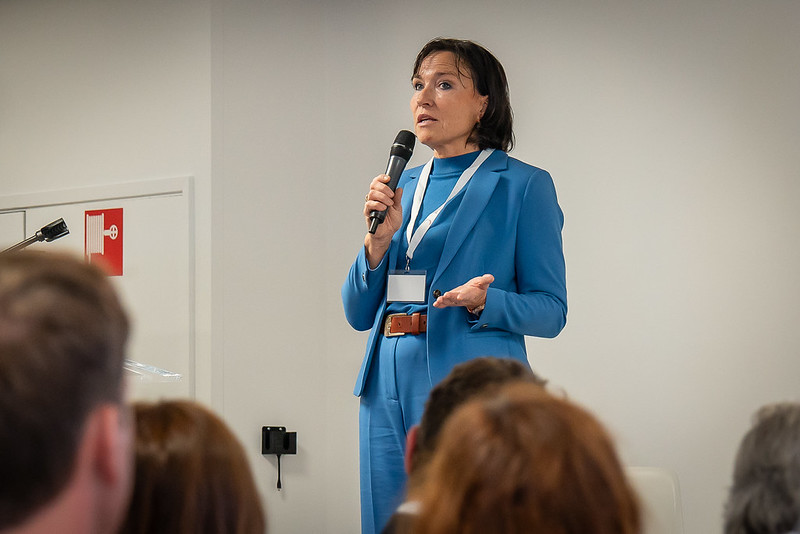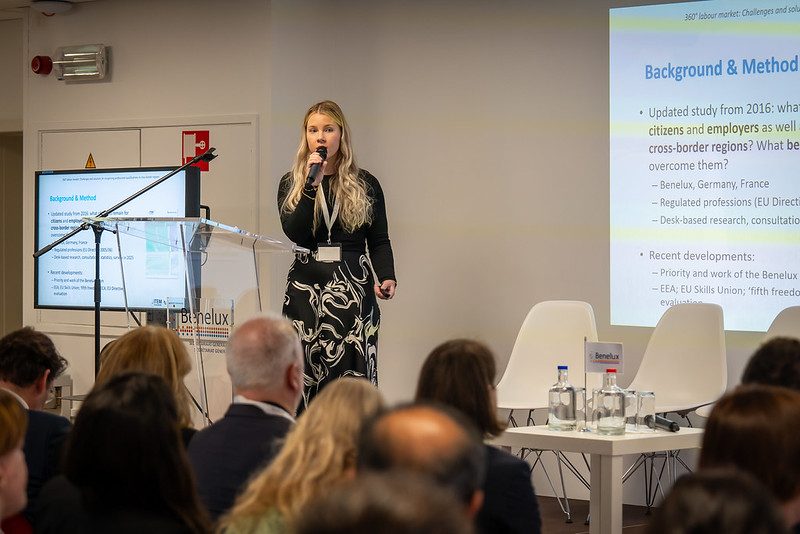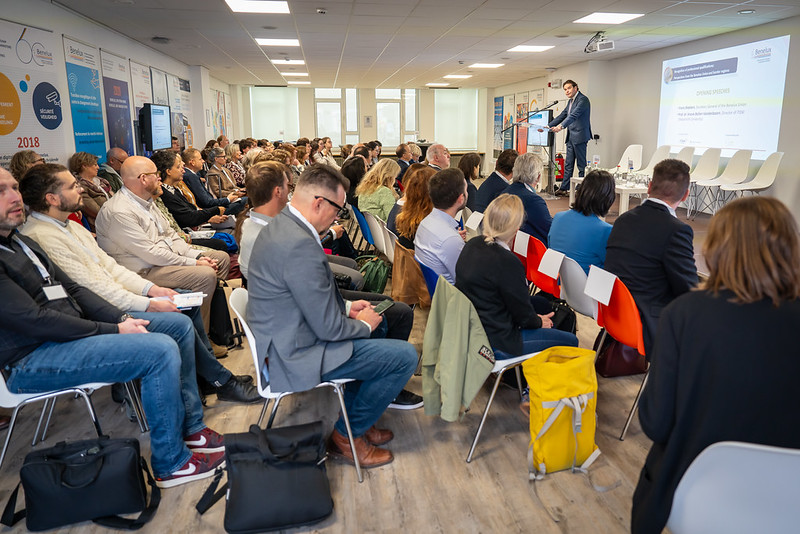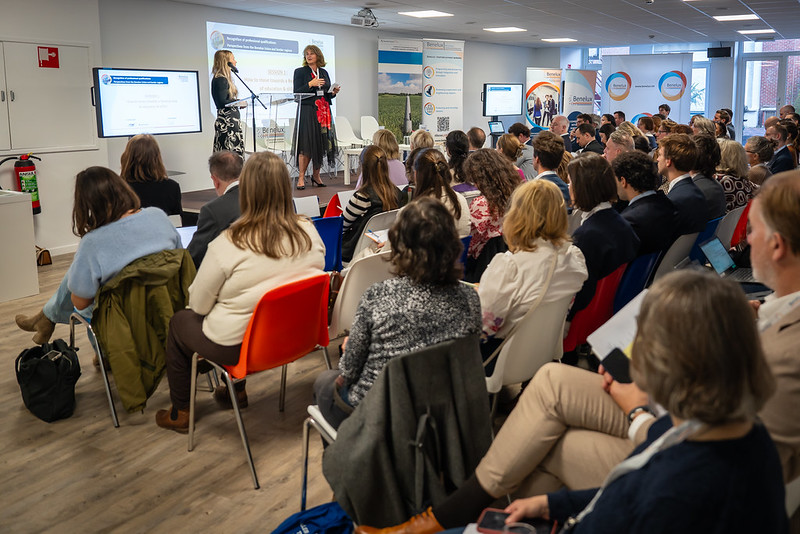On 9 October 2025, over 80 experts, policymakers, and cross-border partners gathered at the Benelux House in Brussels for a conference focused on a key issue: the recognition of professional qualifications within the Benelux and its border regions.
Co-organised by the the General Secretariat of the Benelux Union and ITEM (Maastricht University), in partnership with the UniGR-Center for Border Studies, the event aimed to:
- Present the latest Benelux developments on recognition of professional qualifications;
- Share the findings of ITEM’s 2025 Cross-border Impact Assessment: “360° labour market: Challenges and solutions for recognising professional qualifications in border regions”;
- Highlight the complementarities between Benelux efforts, EU initiatives and other cross-border frameworks;
- Create a platform for policymakers and experts to exchange good practices and operational solutions.
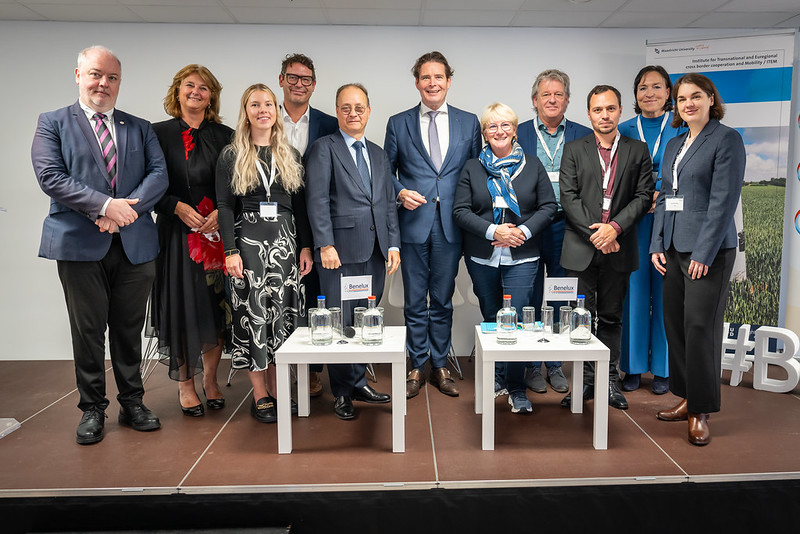
A Benelux priority as an answer to labour market needs
In his opening speech, Benelux Secretary General Frans Weekers stressed: “Removing mobility barriers is no longer a distant goal — it’s a necessity for our economies, our regions, and above all, for our citizens.”
In the face of labour shortages and rapidly evolving professions, ensuring the smooth recognition of qualifications has become a strategic priority — both for the Benelux and for the European Union. The issue also features prominently in the Benelux’s annual and multiannual programmes, as well as the agenda of the Luxembourg Presidency in 2025.
Building on its pioneering role within the European Union — particularly in the field of academic recognition — the Benelux is now aiming to take a further step forward. Following the entry into force in 2024 of the multilateral Treaty on the automatic recognition of higher education diplomas between the Benelux countries and the Baltic States, the Union now seeks to establish a true Benelux Area of Education and Skills, by extending this momentum to the recognition of professional qualifications.
Mapping out challenges and solutions for the recognition of professional qualifications
Over the past year, the Benelux General Secretariat and ITEM have worked closely to map the barriers to recognition of professional qualifications and identify practical, implementable solutions.
These barriers and solutions are presented in ITEM’s 2025 Cross-border Impact Assessment: “360° labour market: Challenges and solutions for recognising professional qualifications in border regions”
This recently published study presented at the conference confirms that the recognition of professional qualifications remains a barrier to labour mobility in the EU, particularly in border regions. Although Directive 2005/36 provides a legal framework for professional mobility, it is more suited to transnational mobility and fails to address the specific needs of cross-border regions. Lengthy and complex procedures, combined with limited harmonisation across Member States, continue to hinder the development of a fully integrated 360° cross-border labour market. Streamlining and accelerating recognition processes is therefore essential to strengthen these regions. In addition to identifying obstacles, the study highlights several promising best practices and innovative approaches. These include, for instance, joint degrees and programmes, cross-border apprenticeships, and tools that improve transparency of skills and qualifications. However, such initiatives are still fragmented and mainly limited to bilateral or pilot projects. ITEM recommends scaling up these initiatives into long-term structural agreements. Harmonisation efforts should focus on expanding automatic recognition and bridging the differences between training and education systems. The Benelux Union could serve as a model by identifying comparable professions and facilitating mutual recognition, drawing inspiration from EU instruments like the ‘Common Training Frameworks’. Together, these measures could pave the way toward a more efficient and truly integrated 360° cross-border labour market.
A one-day event to address these challenges and find common solutions
As part of these ongoing efforts to improve the recognition of professional qualifications, the Benelux-ITEM Conference brought together a wide range of stakeholders from the Benelux and neighbouring regions.
The morning plenary session, open to a broad audience, addressed the common challenges related to the recognition of diplomas and professional qualifications at both the Benelux+ and European levels.
The first segment was divided into three parts:
- First, a session with political representatives that has enabled to highlight that this issue ranks high on the political agenda — whether at the level of the European Parliament, the Benelux Parliament or the Parliament of the German-speaking Community. These contributions highlighted the added value of accelerating and deepening Benelux cooperation — as enabled by Article 350 of the TFEU — particularly through the use of legal instruments such as decisions or recommendations.
- Second, a pitch session focusing on practical initiatives from the field. Cross-border projects led by university networks (e.g. University of the Greater Region, Euregio Meuse-Rhine University Network) and vocational training institutions (such as the MOVE certificate presented by the Rijnland Instituut) showcased the diversity of approaches already in place. Special attention was given to initiatives supporting skills development for the green transition, such as the Green SKHy project on hydrogen-related competences, and circular economy initiatives led by universities in the Euregio Meuse-Rhine.
- Third, a concluding session provided an open dialogue between policymakers and project leaders, focusing on how concrete local initiatives can support broader policy objectives, serve as transferable models for wider implementation, and be scaled up. The discussion also explored ways to enhance the visibility of both existing projects and the cross-border cooperation frameworks that support them.
The second segment offered a reflection on the complementarity between the European agenda — such as the Union of Skills or the modernisation of Directive 2005/36/EC as presented by the European Commission— and the actions undertaken in regional cooperation areas (Benelux Union and Greater Region). Within this context, Deputy Secretary General of the Benelux Union Jean-Claude Meyer presented the two Benelux-areas of work: simplifying recognition procedures for regulated professions under EU Directive 2005/36, and focusing on solutions for strategic cross-border professions such as nurse assistants and industrial electricians. One of the concrete solutions explored was the use of Common Training Frameworks (CTFs) at the Benelux level.
The afternoon workshop, held in a smaller setting, brought together experts from the Benelux countries who are directly involved in processing recognition applications in the health and education sectors. Lively discussions took place on current practices, common technical challenges, and possible shared solutions. Given the clear value of this exchange, participants agreed to organise a follow-up meeting in 2026, this time including experts from France and Germany, with the aim of building a true Benelux+ community of practice.
In the closing remarks, Deputy Secretary General of the Benelux Union Michel-Etienne Tilemans stressed that “Facilitating the recognition of professional qualifications across the Benelux+ area requires collective effort. Today’s discussions—from political leaders to experts—highlighted a shared commitment to collaboration, which remains key to overcoming barriers. With strong political will and concrete action on the ground, the Benelux is ready to lead by example in supporting cross-border mobility and deeper European integration—especially where it matters most: in our border regions.”
